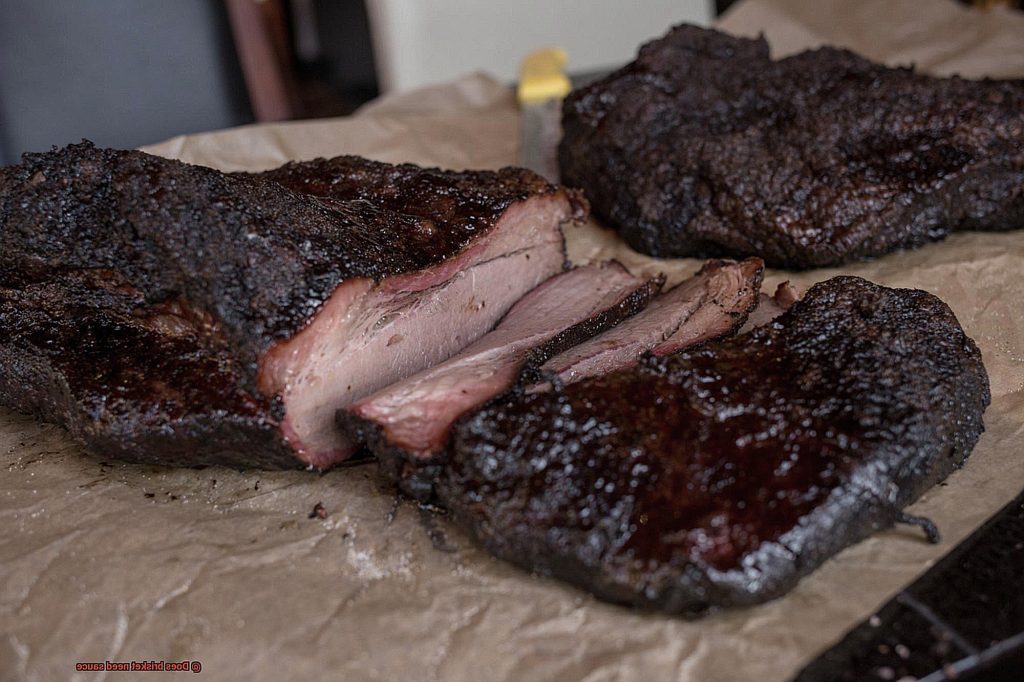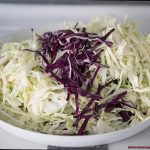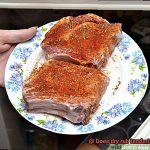Are you a meat lover? If so, then you know that brisket is the king of BBQ meats. This smoky, juicy, and tender cut of beef has been a staple at family gatherings and BBQ parties for generations. But here’s the million-dollar question: does brisket need sauce?
The debate about adding sauce to brisket has been raging for ages among BBQ enthusiasts worldwide. Some argue that seasoning and slow cooking are enough to elevate the flavors of brisket, while others swear by a generous slather of sauce to enhance their experience.
In this blog post, we’ll explore both sides of the argument and give you a detailed overview of what “sauce or no sauce” means for brisket lovers. We’ll delve into the science behind the flavors and texture of brisket and analyze the impact of sauce on the meat.
So whether you’re a die-hard brisket fan or a novice looking to try it out for the first time, this post is for you. Get ready to discover everything there is to know about this age-old debate and find out once and for all if your beloved brisket needs sauce.
Contents
The Benefits of Cooking Brisket Low and Slow
If you’re a fan of barbecue, you’ll know that cooking brisket low and slow is one of the best ways to prepare this cut of meat. This method involves cooking the brisket at a low temperature for several hours, allowing it to become tender, juicy, and packed with flavor.
One of the main benefits of cooking brisket low and slow is that it allows the connective tissue in the meat to break down. This results in a melt-in-your-mouth texture that you won’t get from other cooking methods. When cooked at high temperatures or for a short period of time, the brisket can become tough and chewy, which is not what anyone wants.
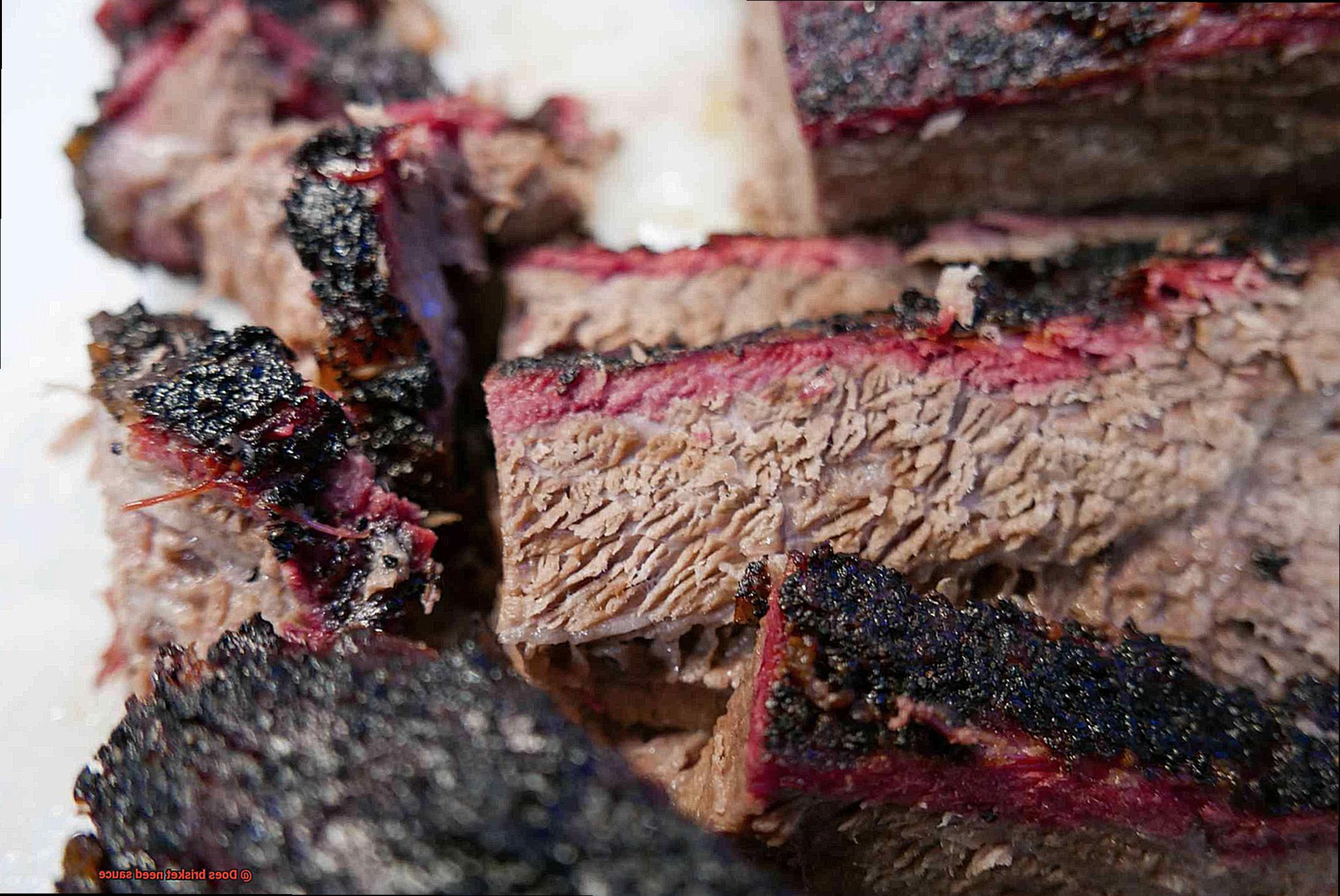
Another advantage of this method is that it allows the fat to render properly. When cooked at high temperatures, the fat can become rubbery or burned, leaving the meat dry and flavorless. However, when you cook brisket low and slow, the fat melts into the meat, adding flavor and moisture.
Cooking brisket low and slow also allows for ample time to add flavor through seasoning or smoking. You could use a dry rub or marinade to season the meat before cooking, allowing flavors to penetrate deep into the beef. Alternatively, you could smoke the brisket with wood chips or charcoal, adding a smoky flavor that complements the natural flavors of the beef.
It’s worth noting that cooking brisket low and slow is a time-consuming process. But trust us – it’s well worth the wait. The end result is tender meat that is bursting with flavor and moisture. While some people argue that sauce is necessary to enhance the flavor of the brisket, we would argue that cooking it low and slow can create a delicious final product on its own.
Does Brisket Need Sauce?
Then, you know the burning question on everyone’s mind: does brisket need sauce? As an expert in this field, I can tell you that there is no one-size-fits-all answer to this question. It depends on several factors, so let’s dive right in.
First and foremost, it’s important to consider the cut of brisket being used. Fatty cuts like the point or deckle are already packed with natural flavor and moisture. These cuts can stand alone without any additional sauce. Leaner cuts like the flat, however, can benefit from a little extra flavor and moisture provided by a well-crafted sauce.
But what goes into a good sauce, you ask? Well, it all depends on your taste buds. For those with a sweet tooth, a simple blend of ketchup, Worcestershire sauce, and brown sugar can do wonders. If you’re looking for something with a little more kick, a spicy tomato-based sauce might be more up your alley. Just remember that the sauce should complement the flavors of the brisket without overpowering it.
Now, let’s talk about personal preference. Some folks prefer their brisket with a thick layer of sauce, while others opt for no additional flavoring at all. Ultimately, it comes down to what works best for your taste buds. Don’t be afraid to experiment with different techniques and flavors until you find your perfect match.
Exploring the Pros and Cons of Using a Sauce on Brisket
It’s a question that has sparked heated debates among grill masters over the years. So, let’s get down to business and explore the pros and cons of using a sauce on brisket.
Let’s begin with the advantages. A well-crafted sauce can add an extra layer of flavor and moisture to your brisket, bringing out the natural flavors of the meat and creating a savory taste explosion in your mouth. Additionally, the sauce can help prevent your brisket from drying out during the cooking process, which is crucial when dealing with a large cut like brisket.
However, there are also some potential downsides to using a sauce on brisket. Some people feel that it can mask or overpower the natural flavor of the meat, taking away from the carefully crafted seasoning and smoke flavors. Furthermore, some sauces can be high in sugar or other additives, making them unsuitable for those with dietary restrictions or preferences.
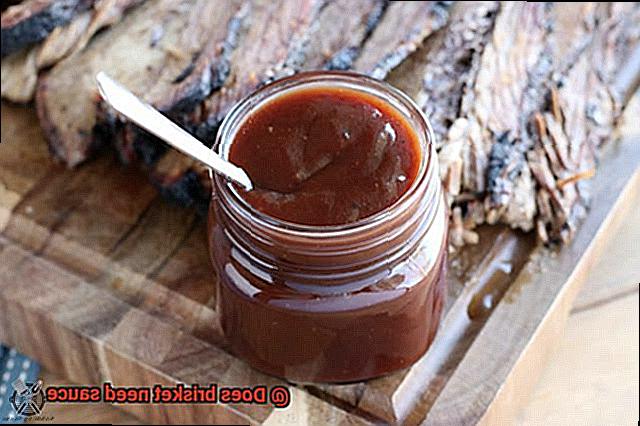
Ultimately, deciding whether or not to use a sauce on your brisket comes down to personal preference and taste. Some grill masters swear by their favorite barbecue sauce recipe and wouldn’t dream of grilling without it, while others prefer to let the natural flavors of their brisket shine through.
If you’re new to grilling and still unsure which route to take, experimentation is key. Try using a sauce on one cut of brisket while leaving another one un-sauced to see which one you prefer. Additionally, consider these sub-topics:
- Types of Sauces: From sweet and tangy to spicy and smoky, there are many types of sauces available for you to experiment with.
- Homemade vs Store-bought: While homemade sauces allow you to tailor the flavor profile to your liking, store-bought sauces can be a quick and convenient option.
- Sauce Application: Whether you choose to brush on the sauce during the cooking process or serve it on the side, the way you apply the sauce can affect the flavor and texture of your brisket.
What Types of Sauces Are Best for Brisket?
While some may argue that a well-cooked brisket should be enjoyed on its own, many people swear by a good sauce to complement the meat’s taste. In this blog post, we will explore five types of sauces that can elevate your brisket game.
Classic BBQ Sauce
One of the most popular sauces for brisket is a classic BBQ sauce. It’s sweet, tangy, and slightly smoky, making it the perfect complement to the bold flavors of the meat. This sauce typically includes ingredients like ketchup, brown sugar, vinegar, and spices like paprika and chili powder. However, be cautious not to use too much sauce as it can overpower the natural taste of the beef.
Spicy BBQ Sauce
If you’re someone who likes a little heat in their food, then a spicy BBQ sauce might be the one for you. These sauces often contain ingredients like cayenne pepper or chili powder and can add a nice kick to your dish. However, make sure to taste-test it beforehand to ensure it’s not too overpowering.
Honey Mustard or Maple BBQ Sauce
For those who prefer a sweeter sauce, honey mustard or maple BBQ sauces can be a great choice. These sauces have a sweet and savory flavor that pairs well with smoky brisket. Plus, they add a nice glaze to the meat, making it look even more appetizing.
Fruit-Based Sauce
If you’re feeling adventurous and want to try something different, consider using a fruit-based sauce like cherry or peach glaze. These sauces add a sweet and fruity flavor to the brisket and can help balance out any saltiness or smokiness in the meat. However, make sure not to use too much as it can be overwhelming.
Mustard-Based Sauce
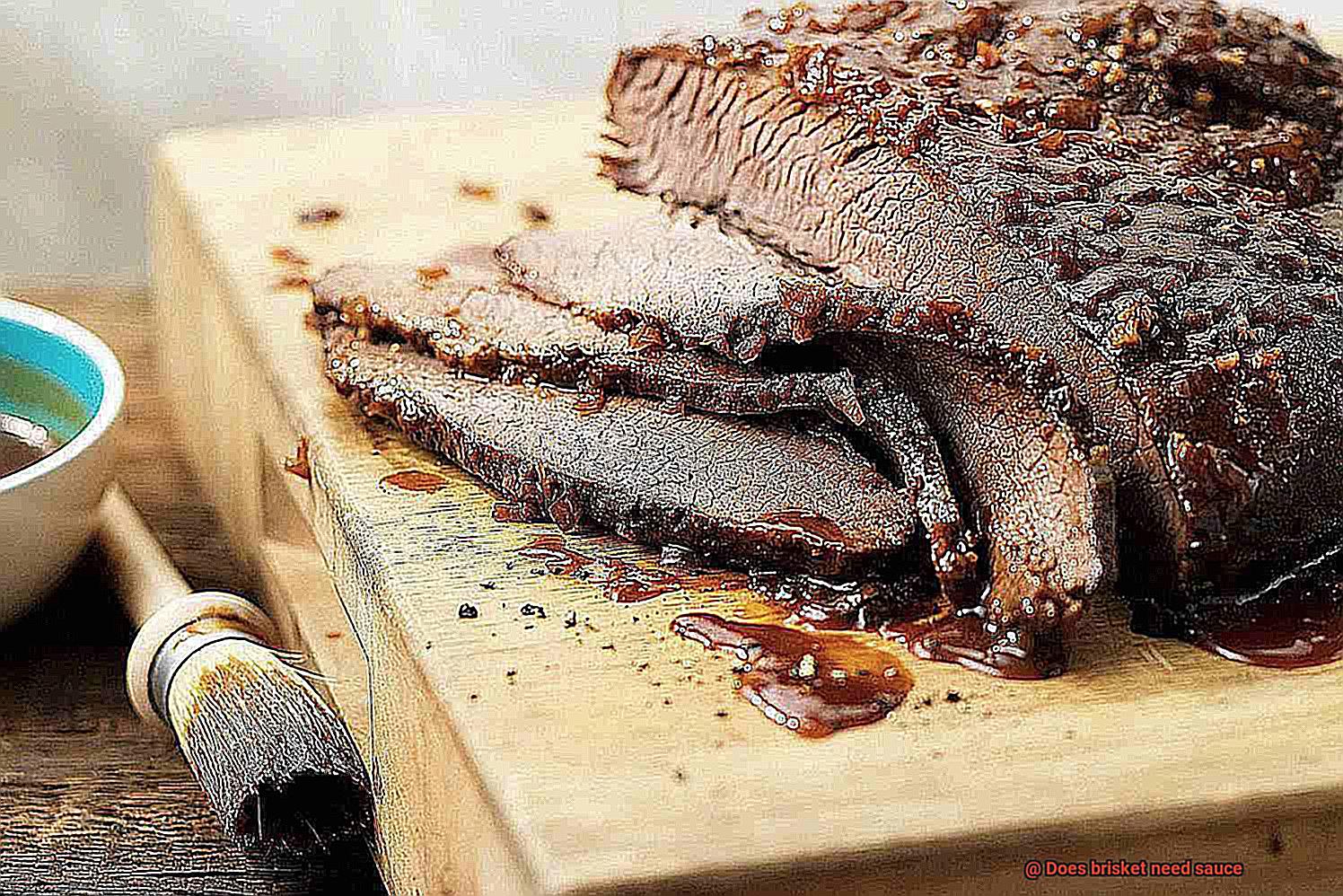
Another option is a mustard-based sauce, which is common in South Carolina. It has a tangy and slightly acidic flavor that can cut through the richness of the brisket. This sauce is made by combining mustard, vinegar, sugar, and spices.
Non-Traditional Sauces
Finally, don’t be afraid to try non-traditional sauces like chimichurri or salsa verde. These sauces have a bright and fresh flavor that can cut through the richness of the brisket and add a nice contrast of flavors. Chimichurri is a green sauce made with parsley, garlic, vinegar, and oil, while salsa verde is made with herbs like cilantro and parsley and includes ingredients like garlic and lime juice.
Dry Rubs vs. Sauces: What’s the Difference?
When it comes to seasoning this delicious cut of meat, there are two popular methods: dry rubs and sauces. Let’s explore the differences between them to help you make an informed decision for your next cookout.
First, let’s talk about dry rubs. This mixture of spices, herbs, salt, and sugar is rubbed onto the surface of the meat before cooking. Dry rubs are a great way to enhance the natural flavor of the brisket and create a tasty crust on the outside. Plus, they’re incredibly versatile – you can adjust the ingredients to suit your taste preferences.
On the other hand, sauces are made from a combination of ingredients such as ketchup, vinegar, sugar, and spices. Sauces add a more liquid coating to the meat and offer a wide range of flavors that can complement or even mask the natural flavor of the brisket. Some people prefer this method because it adds moisture to the meat and creates a more saucy experience.
The texture and application method also differ between dry rubs and sauces. Dry rubs are applied directly to the meat and create a crust during cooking, while sauces are typically added during or after cooking.
But which one should you choose? It all comes down to personal preference. Some people prefer their brisket with just a dry rub for a more natural flavor, while others enjoy the added moisture and flavor that sauce provides. It’s worth noting that some cuts of brisket are more tender and flavorful than others, so they may not need as much sauce or seasoning.
If you’re unsure about which method to use, why not experiment with both? You could even combine them for a unique flavor profile that will have your taste buds dancing. Just remember to adjust the ingredients and cooking time accordingly.
Tips for Adding Flavor to Your Brisket Without a Sauce
Here are five tips to make your brisket explode with flavor without using any sauce.
Spice it up with a dry rub.
A dry rub is a mixture of herbs, spices, and seasonings that you can apply to the meat before cooking. Not only does it add flavor, but it also creates a delicious crust on the brisket. For example, you can combine paprika, garlic powder, onion powder, cumin, and brown sugar for a mouth-watering dry rub.
Inject your brisket.
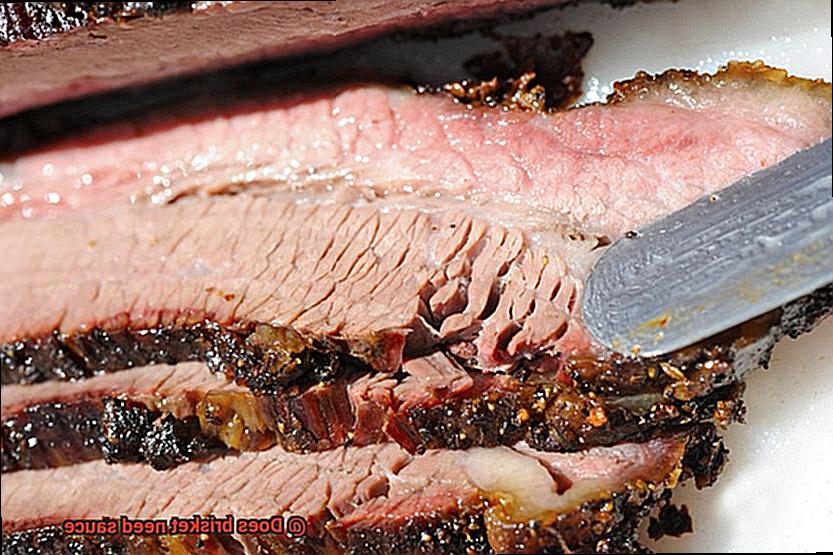
Injecting the brisket with a marinade or liquid seasoning can infuse flavor deep into the meat. Use a meat injector to inject the seasoning into different parts of the brisket. You can use a commercial injection marinade or make your own using ingredients like beef broth, Worcestershire sauce, soy sauce, or apple cider vinegar.
Smoke it up.
Smoking the brisket adds a smoky flavor that enhances its natural taste. Different types of wood chips can be used for smoking such as hickory, mesquite or oak to add unique flavors. You can also experiment with adding herbs like rosemary or thyme to your smoking wood for extra flavor.
Cook low and slow.
Cooking the brisket low and slow allows it to absorb more flavors and become more tender. This technique also allows for a better distribution of seasonings throughout the meat. You can cook it in an oven or outdoor smoker using indirect heat.
Rest and relax.
After cooking, let your brisket rest for at least 30 minutes before slicing. This allows the juices to redistribute and settle back into the meat resulting in a more flavorful and juicy brisket. Covering it with foil will help keep it warm while resting.
How to Select the Right Sauce for Your Brisket
Brisket is a beloved cut of beef that requires a lot of time and care to cook properly. Whether you prefer to enjoy your brisket on its own or with a little bit of sauce, there’s no denying that the right sauce can take this already delicious meat to the next level.
To select the perfect sauce for your brisket, there are a few things you need to consider:
The type of brisket you’re cooking
Different styles of brisket may pair better with different types of sauces. If you’re cooking a Texas-style brisket, for example, a bold and tangy BBQ sauce may be just what you need. But if you’re making a more traditional Jewish-style brisket, a sweet and savory onion-based sauce could be the way to go.
The flavors you want to highlight
Do you want to emphasize the smoky flavor of the meat or add some sweetness? Think about what flavors will complement your brisket and help bring out its natural taste.
Don’t be afraid to experiment
There are countless sauces out there, from classic BBQ sauces to spicy salsas and fruity glazes. Try out different options until you find one that works best for your palate.
Consider a dry rub
While sauces can certainly add flavor to your brisket, don’t forget about dry rubs. A mixture of spices and herbs rubbed onto the surface of the meat before cooking can create a flavorful crust while allowing the meat to cook slowly and retain its juices.
Remember that less is more
When it comes to sauce, it’s important not to overdo it. You don’t want the sauce to overpower the natural flavors of the meat. Instead, aim for a subtle sauce that enhances the taste of the brisket without overwhelming it.
qsCVMmmNRec” >
Conclusion
In the world of BBQ, the question of whether or not brisket needs sauce is a hotly debated topic. Some argue that the slow-cooking process and seasoning alone are enough to create a mouth-watering meal, while others insist on slathering their brisket with a rich and tangy sauce.
Low and slow cooking allows for ample time to infuse flavor into the meat. A dry rub can create a delicious crust on the outside while injecting it with marinade or liquid seasoning can add depth to the flavor profile. And let’s not forget about smoking – this technique adds a smoky flavor that perfectly complements the natural taste of brisket.
When selecting a sauce for your brisket, there are many factors to consider. The type of brisket being used, personal preferences, and desired flavors all play a role in making this decision. Classic BBQ sauce is always a crowd-pleaser, but there are also options like spicy BBQ sauce, honey mustard or maple BBQ sauce, fruit-based sauces, mustard-based sauces, and even non-traditional options like chimichurri or salsa verde.
Ultimately, whether you choose to serve your brisket with or without sauce is entirely up to you. Don’t be afraid to experiment with different techniques and flavors until you find your perfect match.

